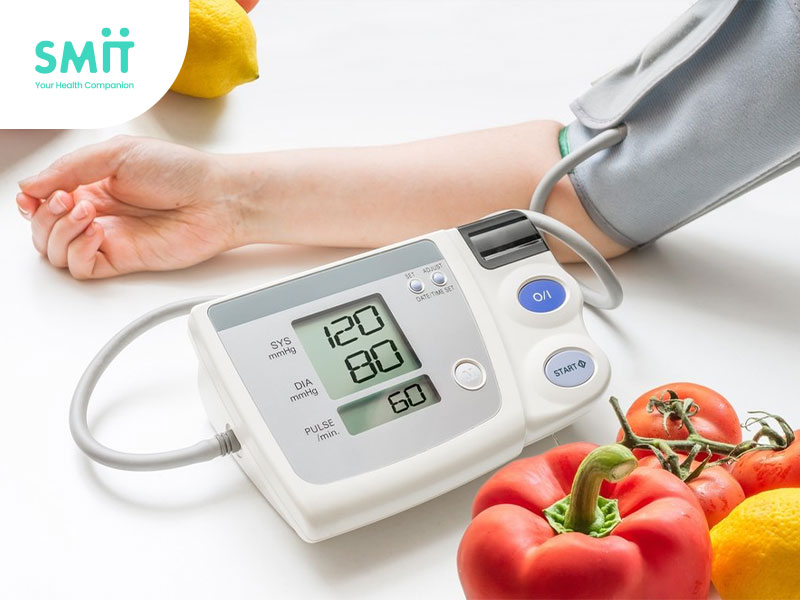India is experiencing a rise in hypertensive patients, especially the middle-aged population, because of inappropriate food habits and sedentary lifestyles.
Hypertension, in simple terms, can be defined as elevated blood pressure when blood flows through arteries with force. An individual is said to be hypertensive when the blood pressure rises above 140/90.
Hypertension is also described as a hurry-worry-curry disease and is a silent killer. Many times, it goes undetected unless the body manifests a major symptom, and can be life-threatening if ignored. Blood pressure escalates when the blood flows with pressure through narrow arteries The narrowing is the result of the formation of plaque. Plaque is a deposition of fat and cholesterol within the arteries. High fat intake especially saturated fat, excess alcohol consumption, less physical activity, are a few reasons contributing towards plaque deposition. It takes years altogether for the deposition of fat to take place. Therefore, making the right choices early on can prevent many lifestyle diseases.
Who is at risk?
Couch potato lifestyle – Inactivity is the biggest manageable factor causing hypertension. Sitting in one place for a long time reduces the BMR ( Basal metabolic rate ) which affects the calorie-burning rate of the body at rest. Since fewer calories are burnt It adds to the body fat percentage. BMI is a good indicator to check your weight status. To calculate your BMI click on the below link http://php74projects.local/smitfitold/bmi-calculator-form/
Does hypertension run in your family? – Heredity can be an important aspect to consider when risk factors for hypertension are considered. Not everyone is at risk, but incorporating positive health and lifestyle habits can keep hypertension at arm’s length.
Age is just not a number – The risk of developing hypertension increases with age, as structural changes are taking place in the arteries. With age, arteries become stiffer and restrict blood flow. Physical activity may be restricted as age increases, and may indirectly affect blood pressure levels. https://www.ncbi.nlm.nih.gov/pmc/articles/PMC4768730/ gives us an idea about how hypertension is related to age.
What’s on your plate? – Diet is one of the most crucial risk factors for hypertension. Food choices are so powerful that they can either elevate the condition or prevent it.
Diets high in saturated fats can increase the cholesterol in blood, forming plaque within the arteries, and obstructing blood flow. A few examples of high saturated and trans-fat foods are processed foods, bakery items, oil-based gravies, sweets, and red meat like beef and pork.
.
Are you under constant stress?
Emotional discomfort can cause the elevation of blood pressure. It is generally an acute state. When the body is under emotional stress, it releases stress hormones, namely adrenaline and cortisol. These hormones constrict the blood vessels and cause blood to flow with pressure. This is when we observe an increased heart rate. Frequent stress may contribute to developing hypertension.
Is smoking or drinking a habit? – It is observed that individuals who smoke and consume alcohol regularly are at a greater risk of developing hypertension, than individuals who do not smoke, and consume alcohol in moderation.
Is salt a culprit?
Salt forms an integral part of our meals. This essential ingredient can create wonders by giving a whole new dimension to dishes. But are you aware that this essential ingredient can also create havoc in our system if consumed in excess? The average daily requirement is sufficient in milligrams, but often people tend to eat salt beyond prescribed limits. Many problems are associated with an increased intake of salt, leading to chronic health ailments. To begin with, it starts stiffening the arteries and blood vessels leading to high blood pressure, eventually leading to heart diseases. Water retention is another major problem faced by people, especially for those with a high BMI. Salt retains water in the body, giving a puffy or bloated appearance, which is also a common reason behind weight gain. Overconsumption of salt has also been linked to cardiovascular and kidney diseases, as well as stroke. It can be a threat to other medical conditions like asthma, osteoporosis, and even some cancers.
So, before it becomes life-threatening, over consumption of salt should be stopped, and had judiciously. Simpler methods can be adopted to avoid excess intake of salt, like eating homemade food rather than ordering from any eatery. Fresh foods can be used instead of canned, processed or preserved foods, as they contain a large amount of salt. A variety of salt is available nowadays, and can be used to replace table salt to minimize the sodium content. Himalayan Pink salt can be used to please our taste buds, and it has a low sodium content. Choosing wisely can help in maintaining healthier lifestyles and keep us free from ailments.
Quick tip – Stop sprinkling excess salt on food. Try and use a combination of table salt, black salt, and pink salt to cut and manage sodium levels.
Ways to prevent hypertension…. Try this out –
1) Nourish your cells –
A clean and balanced nutrition is a good way to keep all our blood parameters in check.
Fresh vegetables, fresh whole fruits, nuts and seeds, and whole grains keep our cells healthy and happy. Increase your fluid intake. Water helps to flush out toxins and keeps the body clean from within.
Tip – Herbs, spices, and condiments have medicinal properties. Try and mix them in recipes often.
2) Go high on fibre – Fibre, especially soluble fibre, plays an active role in –
– keeping blood pressure in control by reducing bad cholesterol
– reducing fat percentage/weight reduction
– bringing down escalated blood sugar levels
– cleaning the digestive tract (it acts like a brush to clean the waste matter in your digestive system)
Tip – Include lots of fresh vegetables and fruits in your diet. Around 40% of your diet should contain raw food-based recipes. Check out this video to learn about foods that lower blood pressure – https://www.youtube.com/watch?v=JlPNmKDgk24
3) Mind your salt intake –
Salt has a major role to play in developing hypertension. Keep a check on total salt consumption through visible (table salt) and invisible sources (sauces, pickles, packaged food, salted/fried snacks). Total salt intake should not cross 5gms/day, which is roughly about a teaspoon.
Tip – Mindful shopping is the key. Check food labels for sodium content and trans-fats.
4) Grab those healthy nuts – Nuts and seeds are excellent sources of essential fatty acids like omega 3. It increases good cholesterol levels (HDL levels), keeping bad cholesterol under control.
Tip – Include one teaspoon of flaxseeds every day. Other options to choose from are sesame, sunflower, and pumpkin seeds. Have a few walnuts and almonds for a mid-meal snack.
5) Fat out, health in – Fat loss/weight loss manages health in total. It helps in reducing blood pressure and reduces the overall pressure on the cardiovascular system.
Tip – To get the best results for fat loss, try out high fibre, moderate protein meals along with some physical activity.
6) Tie those laces and move – Any form of aerobic activity is the foundation of a strong cardiovascular system. In short, your heart health improves every time you exercise. Exercise improves overall health, and brings out the best of your physical and emotional state. Exercise boosts the secretion of happy hormones like dopamine, serotonin, and endorphins, making you feel happy and energetic. It also reduces stress to a great extent.
Tip – 45 mins of any type of aerobic activity or a combination of activities like swimming, running, jogging, hill climbing, skipping, or simply walking, helps.
7) Say no to stress – Long-term stress hurts our physical health. Under stress, we tend to choose the wrong foods, and binge eat, causing weight gain. This increased weight brings health complications like diabetes, hypertension, cardiac issues, and emotional issues like low self-esteem, and low confidence levels.
Quick tips to manage stress –
– Take some time out for yourself
– Learn to say No when you actually cannot complete a task
– Meditate or follow deep breathing practices. Checkout our deep breathing video https://www.youtube.com/watch?v=4yRj_fD3Aoc&t=14s
– Exercise regularly
8) Quit smoking and have alcohol in moderation –
Smoking causes the inhalation of many harmful chemicals. These chemicals harm the arteries and promote hypertension. Quitting smoking can help in preventing hypertension and related conditions, and increasing the lifespan.
– Alcohol consumption in moderation has no adverse effect on health, but any excess may increase cholesterol levels significantly, causing your blood pressure to rise.
Keeping all the points in mind, it can be concluded that hypertension is a non-communicable condition. The number of hypertensive individuals is increasing daily. The best part is, it can be prevented with lifestyle changes. Chronic hypertension may lead to other complications like cardiac issues, diabetes, etc.
To understand more about hypertension and diabetes take our health assessment by clicking on the link – http://php74projects.local/smitfitold/assessment/



0 Comments